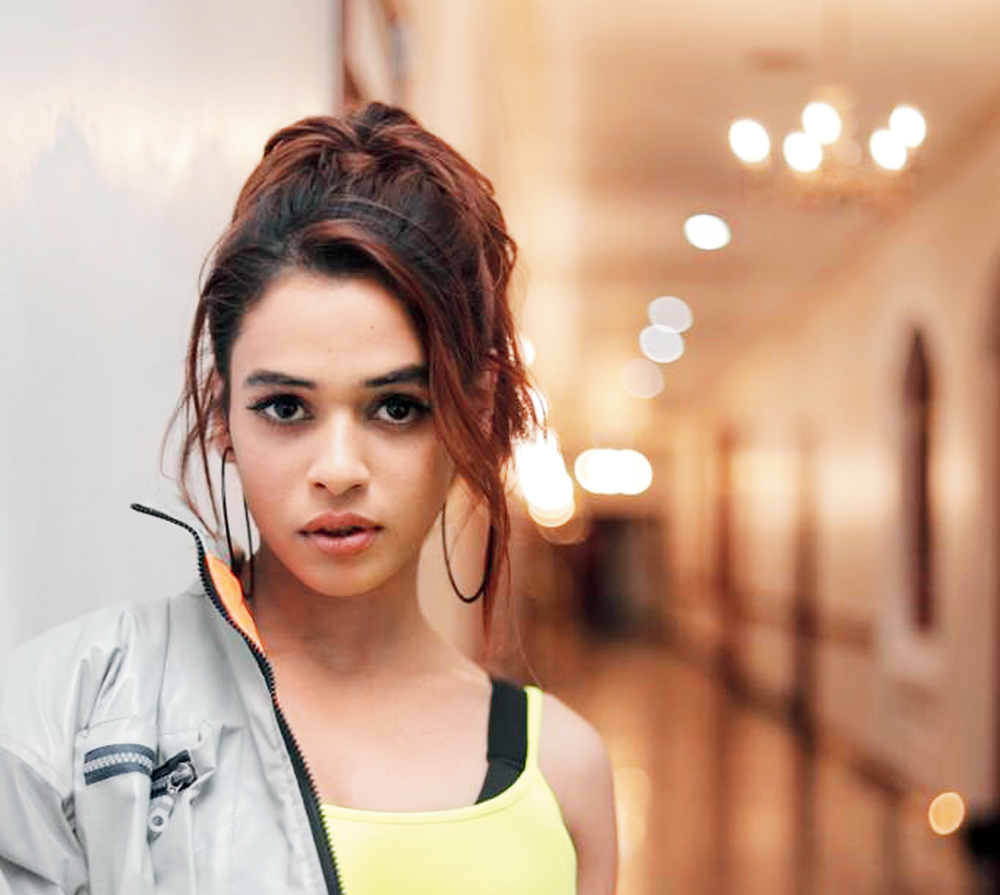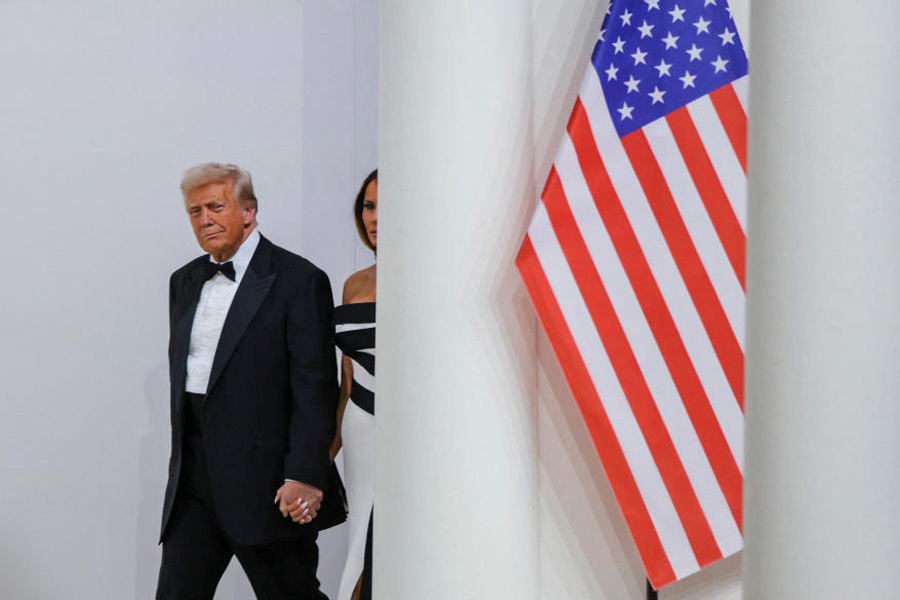Shalmali Kholgade, the voice of bumper Bolly hits like Balam pichkari and Lat lag gayee, has ventured into what for her is virgin territory — independent music. With her single Ruka ruka having garnered over six million streams across platforms and Big Bang Music’s YouTube channel in three weeks, she shared with The Telegraph what it means to finally get to sing her kind of music.
Your first single Ruka ruka has recently been released online. How long have you been planning it?
It’s my dream to make music that reflects my true emotions. It’s finally happening now and I am really excited. It’s always been something I’ve wanted to do.
How did the song happen?
I have been writing my own material for a while. But sometimes I always think it’s better when you collaborate with more people. That’s how Ruka ruka came into being. Digvijay Singh was a contestant on Dil Hai Hindustani, a show I was judging on Star Plus in 2016. He contacted me a year back saying there was a song that he really wanted me to listen to. He played me a minute of the song he had composed. I related to the emotion of the song and said I’d love to come on board. The three of us — Sunny M.R. is the producer-arranger of the track — worked together to develop the one minute he had played for me to a four-and-half-minute song. We also had two lyricists working on the project. The song was in the works for many months and it developed into a finished product over the last couple of months when I was convinced to shoot a video for it.
Is Digvijay a singer or a composer?
He had come to the show as a singer. He sings beautifully and also writes. It came to me as a surprise when he played the tune to me. The one-minute track was sung by him.
With the first single out, is there more coming?
There is more in the pipeline. I am working with a bunch of producers and songwriters. But I felt Ruka ruka should be the one I’d be breaking into the independent music scene with. It’s a melancholic song that comes from a sad space of being, a space nobody has heard me sing in.
Lyrically it also does justice to me as an artiste. All my Bollywood songs are love songs or party songs. Though I am so grateful to get to sing those songs, no one gave me a chance to sing a song about discomfort in a relationship, when you know it could end but you don’t want it to end. You want to make it work. The reason why it is ending is lack of real communication between partners, when the only communication is text messages and emoticons. That’s very relevant today to our generation.
It’s about the person I was becoming. I, too, wanted to send only text messages and not make a call and talk. In the few months I’ve been with the song, I’ve realised that I need to reflect on my life, and my relationships with people have really improved over the last couple of months.
On the show Dil Hai Hindustani you once gave out some material to a contestant to rap. Was that written by you?
That was part of reality television. I have never written in Hindi. I am an English songwriter. I plan to release those in due course. I was in Berkeley over the summer for a five-week programme on performance. Songwriting was one of my electives. A part of the tune towards the end of Ruka ruka was composed by me with Digvijay.
You also have your own YouTube channel.
It’s been alive for four-five years now but I am not consistent in putting stuff out there. It will become my focus now since I am generating original content. Ruka ruka though will come on the label Big Bang Music that is taking care of my independent music career. I’ve been waiting to join hands with people who understand the music I want to do.
You struck gold with your first Bollywood song Pareshaan (Ishaqzaade). Success came fast for you.
I have a problem with the fact that I didn’t have to struggle a lot. My mom caught me being really sad after Pareshaan released and I was getting so much attention. Once (when) we were on a family trip, she asked me: “Why are you not happy?” I said: “Where is my struggle?” She said: “What you did before this was your struggle. For three days a week for six months, you had to sing at Out of the Blue (a restaurant in Powai) for three hours on request. You travelled to Pune, Monday to Thursday, to rehearse for a cabaret for two months. You put together a show in tribute to Amy Winehouse for which you had to form a band of 12 people and make sure you lived up to what the organisers wanted.” I was still not convinced.
Perhaps my struggle is now to reach where I want to reach. I am working on myself to become the pop star, the independent music artiste, I want to become, alongside being a playback singer.
When was this phase your mother is talking about?
I had finished my BA and I was applying to music schools abroad. In the interim period, I was doing all that. The cabaret was with a Latvian troupe called Bombaloo in which I got a part through an audition. We went to Armenia, Moscow, Mumbai and Pune. I was about to leave for Riga (capital of Latvia) for six months but Pareshaan was about to release and I also got admission to a music school. I had to make some big choices. I ended up staying in India to make a career in playback singing.
So this summer you realised your dream of attending music school?
That’s right. I checked that off my bucket list of sitting in a classroom and studying music.
After Pareshaan, you started getting offers to sing peppy numbers. Was there ever a fear of getting stereotyped?
I don’t think so. After Pareshaan, I did Shayrana (Daawat-e-Ishq), Tera naam doon (It’s Entertainment) and a few others, which were like slow numbers. Later, I started doing Balam pichkari (Yeh Jawaani Hai Deewani), Beech beech mein (Jab Harry Met Sejal) — those sort of songs. Daaru desi (Cocktail) is a mid-tempo song, not a slow song but not a fast one either. But yes, now I get to work in a new space with my independent music project.
A music composer duo once told The Telegraph that the only songs that work these days are party songs. Do you agree?
I think a good song is a good song. It could be a party song or a slow song. What sticks is a good melody. Today maybe the songs that have become popular are fast tracks but that does not mean that’s all that works. It requires perseverance and commitment to make a song that you believe in. It also depends on how much you do to push it out and make sure you did your best that it reaches people, to make sure it is heard. After that, it’s up to them.
Bollywood does a wonderful job of marketing a song even though the singers remain hidden behind the pretty faces on screen. So listeners’ familiarity and demand will always be for the film songs.
That’s up until now. We plan to change that. We have only seen Bollywood music getting promoted. With independent music, I am featuring in my video. I am showcasing a skill set that the audience does not know I have. I not only sing, I also dance. I am a performer. Unless I can project that through my work, there is no way they will know that. Otherwise there is no difference between doing a film song and an independent song. I am attaching my face and my skill set to my music.











